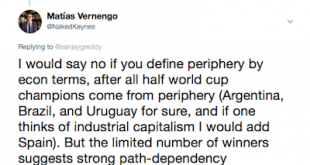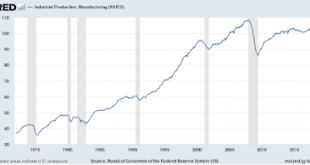Brief note in Spanish (no translation, sorry) on the long history of central banks and the current policies of the Argentinean central bank (BCRA). The gist of the argument is that while central banks where created to finance developmental states in the nascent merchant capitalist societies, in the periphery they tended to follow the Victorian model (implemented later) emphasizing inflation control as the main official goal. However, often, as in the recent case of the BCRA, they are used...
Read More »IMF Programs: Past and Present
A roundtable with Daniela Gabor, Roberto Lampa and Pablo Bortz, on the IMF and its Programs this Thursday in Buenos Aires, organized by the Masters in Economic Development at the Universidad de San Martín (UNSAM).
Read More »A crisis gone to waste
[embedded content] My interview with INET from January 2017 at the ASSA meetings in Chicago. From the INET link:After the Great Depression, global capitalism underwent serious reform. Why didn’t that happen after 2008?Matias Vernengo, Professor of Economics at Bucknell University, explains how a crisis can reveal that the dominant neoliberal orthodoxy is in fact based on a shaky theoretical foundation. But for new economic thinkers to capitalize on that requires a clearly articulated...
Read More »Classical Political Economy and the Evolution of Central Banks
Casa di San Giorgio, an early central bank? Paper presented twice is now published in the RRPE. It tries to bring the surplus approach tradition ideas to discuss the historical origins and the definition of what a central bank is and should do.From the abstract: The paper analyzes briefly the changing ideas on the role of money and banks from William Petty to Thomas Tooke, including the works of Adam Smith, David Ricardo, and Karl Marx. It analyzes the role of ideas in shaping the...
Read More »At the Rick Smith Show on the Economy and the Exit from the WTO
[embedded content]I suggested my posts on Free Trade during the show. Here a series of posts that might be helpful.
Read More »Path Dependency and Football
So now that we are to the round of 16, I think my reply to Sanjay Reddy's question can be evaluated. Note that from the 16, 5 are from Latin America (Argentina, Brazil, Colombia, Mexico, and Uruguay), one from Asia (Japan) and 10 from Europe (Belgium, Croatia, Denmark, England, France, Portugal, Russia, Spain, Sweden, and Switzerland). Of those 6 have already won a World Cup (Argentina, Brazil, England, France, Spain and Uruguay) and 1 played at least a final (Sweden, lost against Brazil...
Read More »Why Manufacturing Still Matters
I've been reading in the spare time (not as much as I would like, and worse with the World Cup) Louis Uchitelle's Making It: Why Manufacturing Still Matters. I tend to agree with the general idea of the book and with many of the policy conclusions, even though I have some problems with minor points (for another post). As a result of this I went to check manufacturing output. There are many different statistics to check in the FRED database. Below a measure of industrial output. And yes, it...
Read More »Raúl Prebisch: Peripheral Development
Our book is out (in Spanish). You can buy it here. We have written a few papers in English if you are interested available here, and here, for example. my review of Dosman's biography is available here.
Read More »Football (soccer) and Capitalism
Not The Economist's field of expertise The World Cup is about to start. The Economist has run a piece suggesting that "the World Cup [is] the fulfillment of some of our most cherished values." And yes the cherished values are essentially free trade, the raison d'être for the creation of the magazine (that has a problem of self-image and refers to itself as a newspaper), and more generally laissez-faire capitalism, of which the publication is one of the most important cheerleaders.There...
Read More »Financialization in Latin America
New book edited by Martín Abeles, Esteban Pérez Caldentey and Sebastían Valdecantos. From the description: The chapters in the book analyze the logic and effects of financialization in developing economies, peripheral financialization so to speak, in particular in Latin America. The first chapters look at the topic from a historical and conceptual angles, and then the latter chapters concentrate on specific manifestations like the influence of financialization on productive investment,...
Read More » Naked Keynesianism
Naked Keynesianism







